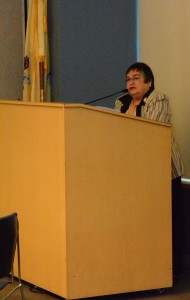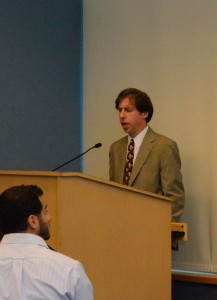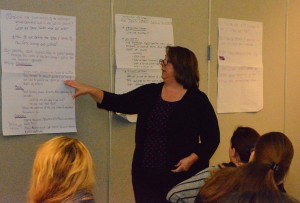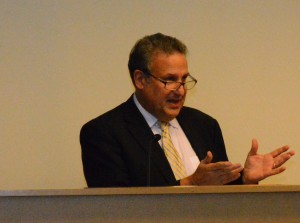- About Ramapo
- Academics
- Admissions & Aid
- Student Life
- Athletics
- Alumni
- Arts & Community
- Quick Links
- Apply
- Visit
- Give
GUMPERT TEACHERS’ WORKSHOP: GENOCIDE, CRIMES AGAINST HUMANITY AND MASS ATROCITY: DEFINITIONS, POLITICS AND THE QUEST FOR JUSTICE
(PDF) (DOC) (JPG)December 22, 2015
(MAHWAH, NJ) – On November 18, 2015, The Gross Center for Holocaust and Genocide Studies in cooperation with and funding from the New Jersey State Commission on Holocaust Education sponsored a Gumpert Teachers’ Workshop, “Genocide, Crimes Against Humanity and Mass Atrocity: Definitions, Politics and the Quest for Justice.” Held at Ramapo College, it was attended by 60 educators from all over New Jersey.
As noted in Center Director Michael Riff’s welcoming remarks, the workshop was intended to help teachers comprehend the evolving nomenclature and legal concepts surrounding genocide, so as to become better able to edify their students.
 Speaking on behalf of the New Jersey Commission on Holocaust Education, Associate Director Dr. Joan Rivitz took the matter further by indicating how discussing the experiences of children and teenagers in the Holocaust could help educators to confront issues beyond genocide, including bullying and human rights with their students.
Speaking on behalf of the New Jersey Commission on Holocaust Education, Associate Director Dr. Joan Rivitz took the matter further by indicating how discussing the experiences of children and teenagers in the Holocaust could help educators to confront issues beyond genocide, including bullying and human rights with their students.
 Author and scholar Mark Lewis, associate professor of History at the City University of New York’s College of Staten Island in his keynote lecture took participants on a journey, beginning with the establishment of the International Court of Justice in the Hague. He concluded with recent work of the International Criminal Court that also has its seat in the same Dutch city and was called into being by the Rome Statute of 1998. Lewis was at pains to point out how far the international legal community has come in moving away from the once-inviolable principle of national sovereignty.
Author and scholar Mark Lewis, associate professor of History at the City University of New York’s College of Staten Island in his keynote lecture took participants on a journey, beginning with the establishment of the International Court of Justice in the Hague. He concluded with recent work of the International Criminal Court that also has its seat in the same Dutch city and was called into being by the Rome Statute of 1998. Lewis was at pains to point out how far the international legal community has come in moving away from the once-inviolable principle of national sovereignty.
Earlier in the semester, Professor Lewis visited Ramapo College to speak about his recently published and award-winning Oxford University Press study, The Birth of the New Justice: The Internationalization of Crime and Punishment, 1919–1950. In that work, he showed that the actions of European jurists were variously motivated. Along with legal organizations not merely interested in ensuring that the guilty were punished or that international peace was assured, they also hoped to instill particular moral values, represent the interests of certain social groups, and even pursue national agendas.
 Using an interactive presentation, Colleen Tambuscio, a Social Studies and Special Education teacher at New Milford High School and a member of the Gross Center Advisory Board, showed how the development of the issues discussed by Lewis could be brought home for students. For example, she showed how an abridged version of the recently released feature documentary, Watchers of the Sky, that depicts how five remarkable people, starting with Raphael Lemkin who coined the word genocide essentially wrote and lobbied for the 1948 U.N. Convention Genocide, and have devoted their lives to trying to punish the crimes listed in the latter so as to prevent them from occurring in the future. Among other materials, Tambuscio recommended to teachers for classroom use was the resource pack of the Exploring Humanitarian Law curriculum available online, prepared by the International Committee of the Red Cross in association with the Education Development Center, Inc. Workshop participants, grouped by table, themselves contributed to the presentation enormously in response to a list of essential questions from which they were asked to derive objectives, activities, and assessment criteria.
Using an interactive presentation, Colleen Tambuscio, a Social Studies and Special Education teacher at New Milford High School and a member of the Gross Center Advisory Board, showed how the development of the issues discussed by Lewis could be brought home for students. For example, she showed how an abridged version of the recently released feature documentary, Watchers of the Sky, that depicts how five remarkable people, starting with Raphael Lemkin who coined the word genocide essentially wrote and lobbied for the 1948 U.N. Convention Genocide, and have devoted their lives to trying to punish the crimes listed in the latter so as to prevent them from occurring in the future. Among other materials, Tambuscio recommended to teachers for classroom use was the resource pack of the Exploring Humanitarian Law curriculum available online, prepared by the International Committee of the Red Cross in association with the Education Development Center, Inc. Workshop participants, grouped by table, themselves contributed to the presentation enormously in response to a list of essential questions from which they were asked to derive objectives, activities, and assessment criteria.
 Culminating the program was a talk by Gross Center Advisory Board chair Peter Safirstein, the managing partner of Morgan & Morgan’s NewYork-based Securities and Antitrust Practice Group, on “the Application of U.S. Tort Law to International Human Rights.” He outlined how until the Supreme Court’s 9-0 ruling of April 2013 in Kiobel v. Royal Dutch Petroleum, foreigners could bring suits in U.S. courts against other foreigners and corporations for human rights violations in foreign countries under the U.S. Alien Tort of 1789.
Culminating the program was a talk by Gross Center Advisory Board chair Peter Safirstein, the managing partner of Morgan & Morgan’s NewYork-based Securities and Antitrust Practice Group, on “the Application of U.S. Tort Law to International Human Rights.” He outlined how until the Supreme Court’s 9-0 ruling of April 2013 in Kiobel v. Royal Dutch Petroleum, foreigners could bring suits in U.S. courts against other foreigners and corporations for human rights violations in foreign countries under the U.S. Alien Tort of 1789.
In particular, Safirstein referenced a 1996 case against Pfizer Pharmaceutical brought by a group of parents from Kano, Nigeria for giving their children reduced doses of the legacy antibiotic in order to skew a drug trial during a meningitis outbreak for a new antibiotic it had developed. Five children who were given that drug died, as did six of those given the legacy antibiotic. Moreover, the families alleged that they had not given their consent for the trial.
Pfizer subsequently settled the case out of court with a $75 million settlement that was subject to a confidentiality clause after, in January 2009, the United States Court of Appeals for the Second Circuit ruled that the Nigerian victims and their families were entitled to bring suit against Pfizer in the United States under the Alien Tort Statute. The nub of the case was that the families of the children in the trial were not told that they were part of a trial and that Doctors Without Boarders (Médecins Sans Frontières) was offering the standard treatment in another part of the same building.
While Safirstein saw little immediate hope of changing the Supreme Court’s Kiobel decision, he did see some hope in using other, more specific statutes, to redress wrongs committed against U.S. nationals overseas. He cited the case of Frank Pescatore, a U.S. mining engineer, who had been kidnapped and killed in Colombia by the FARC guerrilla group. In 2010, his family brought a suit, under the Alien Tort Statute and other laws against Chiquita Brands International Inc. because it “knowingly provided currency or monetary instruments, weapons (including arms and ammunition), and other forms of material support and resources and transport of munitions, to the FARC, a foreign terrorist organization that has killed, maimed, injured, kidnapped and held hostage thousands of civilians, including many U.S. citizens.“ The case is still being adjudicated with Chiquita having, so far, made no attempt to settle.
Another suit mentioned by Safirstein was one brought under the U.S Anti-Terrorism Act that permits U.S. citizens to pursue claims arising from international terrorism. The plaintiffs in that case accused Arab Bank, PLC of facilitating militant attacks in Israel by Hamas and other groups by knowingly acting as a conduit of funds to the families of suicide bombers and perpetrators injured in terrorist attacks in Israel in the post-2000 Intifada. Just last year, after the jury in the trial found for the plaintiffs, Arab Bank decided to settle the case for terms that were not disclosed.
As has been the case for some time, evaluations completed by participants revealed the workshop to have been enormously successful. They found all the presentations to have expanded their knowledge and felt that the information and techniques imparted would be of benefit in the classroom. Quite a number of the teachers in attendance indicated that they eagerly await the announcement of our spring workshop.
E-News Archives
| 2023 | 2022 | 2021 | 2019 | 2018 | 2017 | 2016 | 2015 | 2014 | 2013 | 2012 | 2011 | 2010 | 2009 | 2008 | 2007 |Copyright ©2024 Ramapo College Of New Jersey. Statements And Policies. Contact Webmaster.

Follow Us!